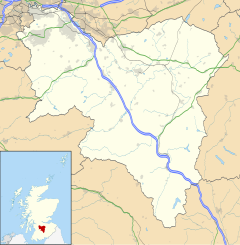Lanark
Lanark
|
|
|---|---|
 Lanark High Street, August 2006 |
|
 Coat of Arms of the Royal Burgh of Lanark |
|
| Lanark shown within South Lanarkshire | |
| Population | 8,253 |
| OS grid reference | NS8843 |
| • Edinburgh | 29 1⁄2 miles (47.5 km) |
| • London | 325 miles (523 km) |
| Council area | |
| Lieutenancy area | |
| Country | Scotland |
| Sovereign state | United Kingdom |
| Post town | LANARK |
| Postcode district | ML11 |
| Dialling code | 01555 |
| Police | Scottish |
| Fire | Scottish |
| Ambulance | Scottish |
| EU Parliament | Scotland |
| UK Parliament | |
| Scottish Parliament | |
Lanark (/ˈlænərk/; Scottish Gaelic: Lannraig,Scots: Lanrik) is a small town in the central belt of Scotland. The name is believed to come from the Cumbric Lanerc meaning "clear space, glade".
Lanark is traditionally the county town of Lanarkshire, though there are several larger towns in the county. Lanark railway station and coach station have frequent services to Glasgow. There is little industry in Lanark and some residents commute to work in Glasgow and Edinburgh. Its shops serve the local agricultural community and surrounding villages. There is a large modern livestock auction market on the outskirts of the town.
Lanark has served as an important market town since medieval times, and King David I made it a Royal Burgh in 1140, giving it certain mercantile privileges relating to government and taxation. King David I realised that greater prosperity could result from encouraging trade. He decided to create a chain of new towns across Scotland. These would be centres of Norman civilisation in a largely Celtic country, and would be established in such a way as to encourage the development of trade within their area. These new towns were to be known as Burghs. Bastides were established in France for much the same reason.
...
Wikipedia

